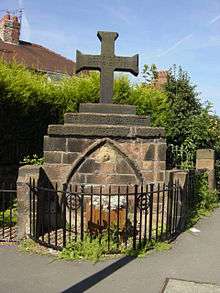Monk's Well
Coordinates: 53°23′59″N 2°54′53″W / 53.3997°N 2.9147°W

Monk's Well is a grade II listed holly well located on Mill Lane, in Wavertree, Liverpool. Constructed during the early 15th century, the well was used by travelers and supported a nearby monetary through alms.
History
According to the well's inscription it was built in 1414 as a local water source for nearby travelers and monks from the nearby monastery known as Monkswell House. Built from sandstone the well originally consisted of the main sandstone well with steps leading down to the spring and topped with a holy cross. This cross when described in 1893 was seen to be lost[1] however a replacement cross was eventually added during the 20th century based on a description of the original.[2]
The well's lower section is inscribed with Latin text which reads "Qui non dat quod habet, dæmon infra videt: 1414". In English this roughly translates as : "He who here does nought bestow, The Devil laughs at him below". This phrase implying that drinkers are expected to pay alms otherwise the devil below will laugh. The restored cross also displays Latin text: "Deus dedit, homo bibit" which translates to God gives and man drinks."
To improve accessibility an iron pump was added in 1835 to pump water from the spring below removing the need for travelers to descend into the chamber below. Over time the well fell into disuse due to the advent of home piping and the demolition of the nearby monastery Monkshouse. However, the well's historical significance was recognised and became a grade II listed structure in 1952.[3] Today the well is non-functioning with its iron tap removed and access to the chamber below converted to a flower bed.
References
- ↑ Charles Hope, Robert. Legendary Lore of Holy Wells in England. London: Elliot Stock. p. 83. Retrieved 22 October 2015.
- ↑ Pollard, Richard; Pevsner, Nikolaus; Sharples, Joseph (12 May 2006). Lancashire: Liverpool and the Southwest (Pevsner Architectural Guides: Buildings of England). Yale University Press. p. 497. ISBN 978-0300109108. Retrieved 22 October 2015.
- ↑ "Notes on Buildings of Special Architectural or Historic Interest" (PDF). liverpool.gov.uk. Liverpool City Council. Retrieved 22 October 2015.